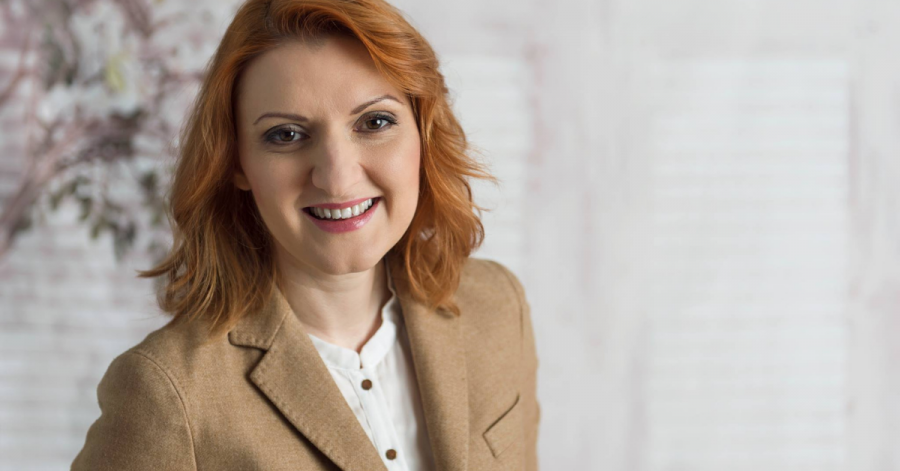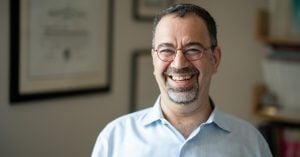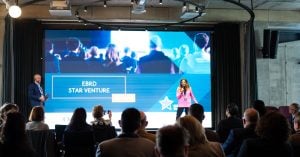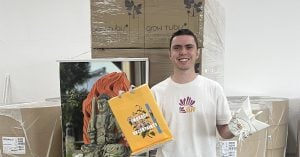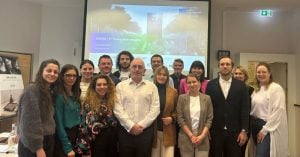In Romania, we are witnessing solutions around sustainability goals emerge at an accelerated pace in the last few months. To address this rising interest, the recently launched ClimAccelerator Black Sea, a program for entrepreneurs with solutions contributing to eco-innovation, will mentor, connect, and fund almost 30 Romanian and Bulgarian-founded startups across all stages of development. The Recursive reached out to 2030 Builders, one of the startups in the MVP stage, to learn more about their ambitions and business model. 2030 Builders is an educational digital platform that uses gamification to help organizations and their employees understand and improve their environmental impact in order to address global challenges.
We talked to Mia Negru, the company’s founder, about the importance of shifting to a collaborative mindset to embrace a more responsible and sustainable way of living as a society, as well as the gap 2030 Builders aims to fill in the sustainability education space. Mia brings her knowledge of the Sustainable Development Framework, as well as experience with entrepreneurship consulting, development facilitation, as well as events coordination.
The Recursive: What is the red thread combining all the different roles you have embraced on your professional journey?
Mia Negru: The red thread has been to help people help each other and the planet, placing a stepping stone for development and impact. Organizing events was about making people happy. When people come together, all the details should be in place so that people spend all their time connecting and collaborating with each other. And then the transition towards launching 2030 Builder was enabled by the entrepreneurial spirit that runs through the family blood.
I started my first business when I was studying in Iasi. Together with my sister, we grew the company, but it failed with the financial crisis. Then, while I was studying at Copenhagen Business School (CBS), I worked with a business angel office where I was doing a lot of due diligence and combining that with my expertise in organizing events. After that exposure, I worked as an entrepreneurship consultant for the Copenhagen municipality, advising people who wanted to open a business.
Meanwhile, I was one of the first generations to study about the Sustainable Development Goals (SDGs) at CBS. And I thought – this framework does not only show us what we are lacking, but also how to drive businesses forward. Every person that sets up a business today needs to have the SDGs in mind. If not how to tackle one of those challenges, then how to avoid having a negative impact on one of the five pillars: people, planet, prosperity, peace, and partnerships.
What does “2030 Builders” do, and who are you addressing with your solution?
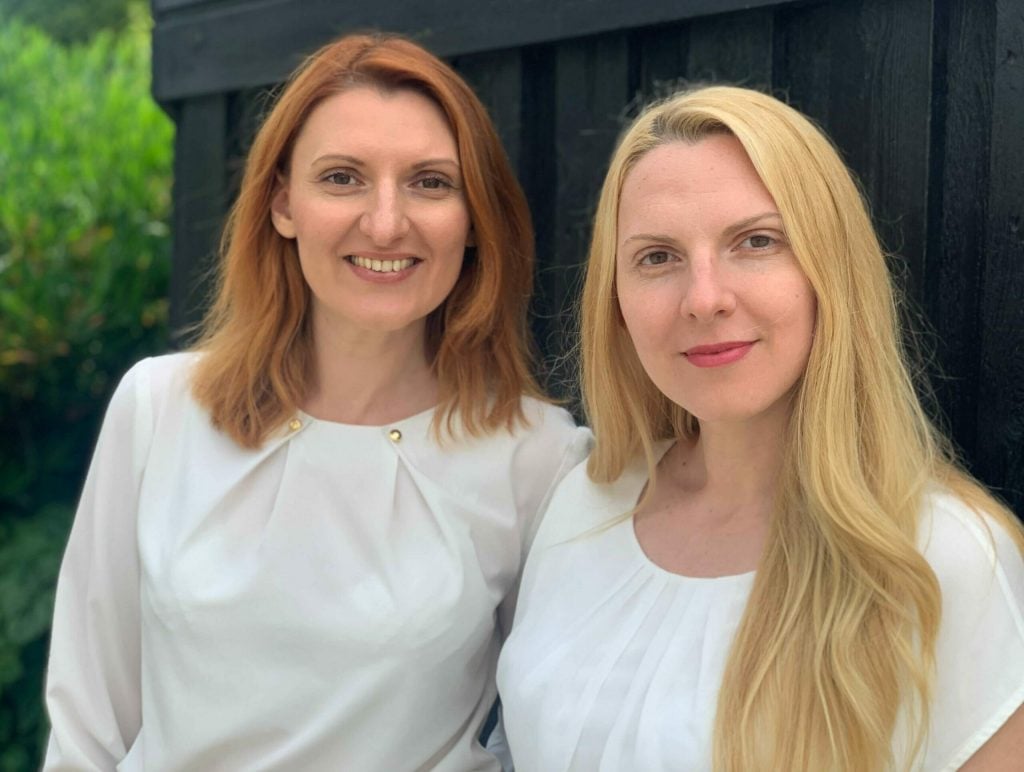
We started driven by the desire to make sustainability everybody’s responsibility. But that implies making it accessible, relatable and actionable for people. Taking it from a dedicated team that sits close to the top leadership and sharing it with every employee in the company, so that each one of them can understand the trade-offs and be incentivized to take small steps.
Sustainability requires a system thinking approach. It requires people to make new connections between various activities. However, so far, the solutions that educate people on sustainability are explaining these concepts from a very general perspective.
What we tried to do with 2030 Builders was to help every individual, depending on their job, understand how sustainability affects their lives, how it is connected to the company’s operations and goals, and why they as employees and citizens need to be part of the solutions. Answering the “why” is the most important part, because this is where we have seen the biggest gap with existing solutions.
Our customers are companies with 1000-5000 employees, mainly Europe-based. We work with big companies like Kraft Heinz from the UK, with the Austrian base of Henkel, as well as with more and more manufacturing and finance companies.
How does the business model work, and what role does gamification play?
We are in an early stage, but we’re seeing companies ready to start taking action and actually involving most of their workforce. We are actually very flexible with our offerings, because we know there’s no silver bullet. So, we really tried to adapt both the product and the end goal to where the customer is on the journey.
The product is now evolving from small gamified experiences into a platform where employees can find more than one touch point, where they can come back to continue the practice, and start journaling their actions. So, we are starting to use green coin rewards to help customers upgrade on the platform, i.e. unlock new quests, new sustainability concepts, new games. Alternatively, green coins can be used as donations for the cause the company wants to support.
Many of the companies we worked with are looking into accessing the platform because they see an interest from their employees, and also because they’ve done some basic e-learning, and notice that it is not enough to make people walk the talk. They understand that people need constant and recurring touch points to go in the right direction. At the end of the day, the paradigm shift of sustainability demands a shift in people’s behavior.
That’s why our newest methodology that includes gamification is developed on behavior change elements, where we try to tap into people’s motivation and the right triggers, so that we can incentivize them to take sustainable actions. We decided to use gamification to pack the complexity of sustainability dilemmas in a more engaging format, a gamified journey. This is also a very Scandinavian approach – solving problems through play, like LEGO does.
How have you been financing the company, and how did you experience the pandemic?
We’ve been bootstrapping so far. The pandemic was quite hard for us because we were expecting to board clients way sooner, but all budgets were frozen, nobody wanted to talk about this. I don’t think sustainability was a priority during this period. But after relaxation, you know, especially in Scandinavia, where 70% of the population is vaccinated and life is back to normal, people are starting to open up, and they are hungrier for this type of conversations.
However, it’s B2B, so it’s a long process of selling. We’re trying to adapt, selling different experiences and products for different needs, including more content in the journey. Our next step will be to apply for private investment and grants. We feel this is a crucial moment to scale: touching upon more companies and employees to create a bigger impact.
Northern European markets are among the highest ranked around the world in terms of combating climate change. What is their recipe of success?
It’s not that they are smarter, or even have more access to innovation, but what is actually embedded in the Scandinavian culture that is helping these countries and positioning them as frontrunners in the green transition is a civic sense.
Everybody takes responsibility for the environment, for the planet, for future generations. They place value on collaboration – we are all in this together, we are responsible, we need to take care of it. So, they look at their country also from a collective perspective: it’s their country, their parks, their roads, and they feel responsible for everything around them. They don’t place that responsibility on others – on their neighbors, on politicians. They don’t say “they don’t clean our streets” – everyone tries to do their own part first.
In Romania, we have beautiful nature, extraordinary places, immense potential, great resources, and bright people. Yet we are very individualistic. We are missing the values and attitudes to motivate us to leave this place better than we found it, for the benefit of future generations.
While we also have civic education in the school curriculum, we don’t properly use that time to teach students civic responsibility. And then there’s television. What is the majority of people exposed to? I think it’s rarely about how people help each other and co-create value in the ecosystem.
What can we do better to locally incentivize this civic engagement in the future?
I feel very hopeful about the younger generations, looking for instance at the colleagues from the Black Sea Accelerator. I see them wanting to set an example.
When I emigrated from Romania, I couldn’t see the light at the end of the tunnel, I couldn’t move forward. But what I learned after I left is that your entire wealth and health is held in your mind and your heart. Whatever you know how to do with your brain and with your hands you can use anywhere.
So, it’s not a system that needs to give you that safety, because you have your safety. I am responsible for keeping my street clean, and my parks clean, and for giving education to my children and communicating much needed values to them. Once people get to this level, they will feel that they actually have the power to change things in their lives, and ultimately change the system.
What advice would you give entrepreneurs in the region?
You should talk to as many people as possible because then you will get feedback that will help you choose the right path. You will also have people jump on board to help you. Share what you’re trying to solve with others. Don’t talk only about the solution, talk also about the challenge.
Also, the world is your oyster. It can be easy to reach across borders, for talent, investors, and customers. To unlock these opportunities, it’s really necessary to think global from the start, to think how your solution will apply in other parts of the world.

